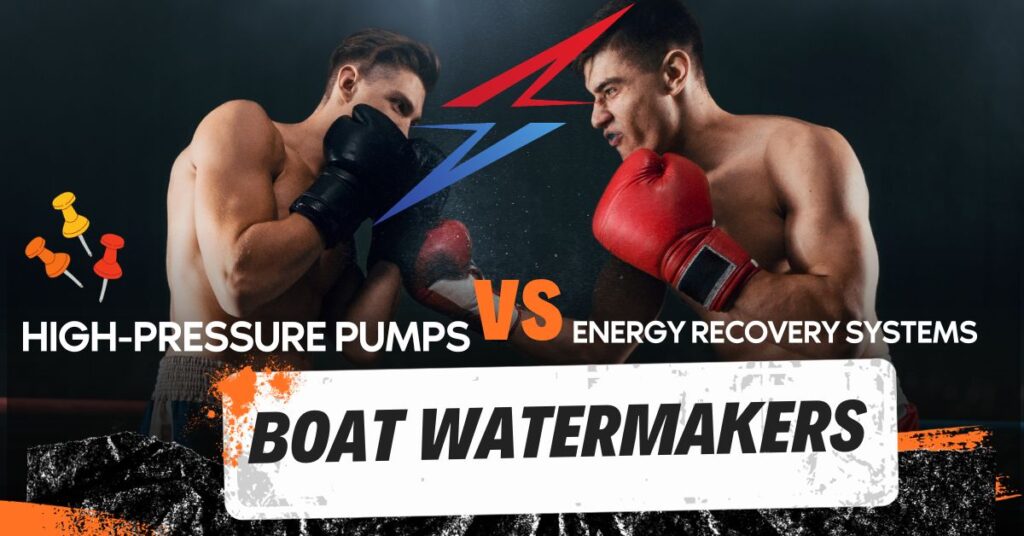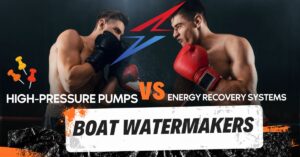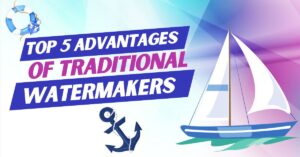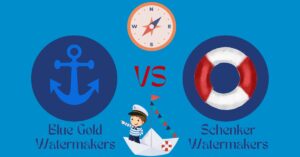Embarking on a safe and enjoyable sailing adventure demands precision in marine equipment choices, and the selection of a boat desalinator is no exception. In a world where technological landscapes have shifted, we invite you to explore the enduring efficacy of traditional boat watermakers, specifically those featuring high-pressure seawater pumps.
Here is why energy recovery desalination systems no longer rule the waves:
Boat Watermakers and Onboard Energy Evolution
The landscape of onboard energy has transformed dramatically in recent years, rendering the need for energy recovery watermakers less relevant. With the rise of efficient solar systems and lithium batteries, small boats no longer struggle with energy scarcity. Renewable energy technology has therefore solved many, if not all, of the problems of freshwater production on medium-small boats.
In fact, our Blue Gold Watermakers seamlessly capitalise on this technology shift by offering a reliable and refined desalination solution for boats without the complexity and flaws of energy recovery systems.
Legacy of Watermakers with Energy Recovery System
Innovations do not last forever. In the case of marine watermakers for boats, both electrical sources and maritime technology evolved and improved.
Schenker watermakers and Spectra desalination systems were once considered a boon for smaller sailing vessels lacking generators. However, their historical drawbacks – erratic performance, delicate pumps, sub-optimal efficiency, high costs, and compromises on water quality – have persisted. Traditional boat watermaker desalination units, utilising high pressure pumps, today provide a more robust alternative with improved performance.
We regularly receive requests from new clients who question their old buying decisions and opt for getting rid of their non-functioning energy recovery watermakers. They choose to installing Blue Gold Watermakers for their simplicity in design and operation.
Blue Gold Watermakers equipped with traditional pumps are built to be robust and reliable and are specifically designed to provide the high pressure required for marine reverse osmosis desalination systems.
Energy recovery systems are more complex, which inevitably leads to increased installation and maintenance costs, in addition to higher upfront costs for boat watermakers. Therefore, many sailors and boat owners prioritise simplicity, cost-efficiency and reliability over energy efficiency.
Modern sailors are more knowledgeable about the benefits and disadvantages of the current marine watermakers and boat desalinators. They are getting tired of being locked with a proprietary boat desalinator brand, very expensive watermaker parts and complex support. So they choose to change and buy a traditional boat watermaker in order to be more in control of its operation and maintenance.
The Subtle but Clear Advantages of Traditional Marine Water Makers for Boats
Here is the 5 key advantages of traditional boat watermakers with a high pressure pump, including Blue Gold Watermakers:
Reliability beyond question
Traditional marine water makers for boats, powered by high pressure pumps, epitomize reliability. Even after extended periods of inactivity or imperfect maintenance, these desalination systems won’t leave you stranded, unlike their energy recovery counterparts.
For example, even if due to a poorly done RO membranes washing procedure, there is some salt water left in the high pressure pump or in some valve, the traditional boat water maker will always start, while an energy recovery low pressure pump will definitely have problems.
Pump durability of modern boat watermakers
Watermaker high pressure pumps, especially with stainless steel heads, are highly tested industrial products, not only in the reverse osmosis marine industry, but also and above all in the food and pharmaceutical sectors, where they work with much higher intensity, performances and pressures than boat desalinators. Their proven reliability, robustness and durability stand in stark contrast to the delicate pumps found in energy recovery systems.
Cost efficiency of Blue Gold Watermakers
Blue Gold Watermakers redefine cost efficiency: one of our 60, 80, or 100/120 l/h boat fresh water makers models presenting a sophisticated alternative at half the cost compared to Schenker watermakers or Spectra equivalents. This isn’t a compromise on quality; in fact, it’s exactly the opposite – our boast superior quality. Our commitment to quality ensures a seamless blend of elegance and performance.
Water quality and RO membranes longevity
The consistent high pressure, characteristic of traditional high-pressure pumps, guarantees the production of high-quality freshwater and extends the lifespan of reverse osmosis membranes. This is precisely what an energy recovery pump fails to deliver, leading to compromised output water quality due to the cyclical pressure generated by the pump and inevitably resulting in a shorter lifespan for the water maker membranes.
Balanced energy consumption
The energy consumption difference between Blue Gold Watermakers and energy recovery systems is minimal. In practical terms, the additional wattage required is easily compensated by modern lithium batteries and efficient solar panels, making the supposed energy savings of energy recovery systems negligible.
In fact, with the advent of lithium ion batteries, increasingly efficient photovoltaic panels and excellent quality inverters at very affordable prices, we can store 10/15 kW of energy on board even with a weight lower than that of a generator and also taking up less space. Indeed, we are able to install lithium batteries in places where we certainly could not install a generator, for example under beds. They are very light and smaller than traditional AGM batteries of the same capacity and do not emit gas.
So if you have, or intend to install a small photovoltaic system and lithium batteries on your boat, it makes sense to purchase a reliable watermaker with a traditional high pressure pump.
EXAMPLE of power consumption – Schenker watermaker vs traditional Blue Gold watermaker:
- An 80 liter Schenker energy recovery watermaker requires 380 Watts, a Blue Gold watermaker 12 V or 24 V equivalent requires 650W, while the 230V model requires 750W (with this, however, we can produce up to 100 l/hour if we fit a slightly more performing PUMP). Therefore, there is a difference of only 270 Watts.
- In two hours of operation (160 liters of freshwater) Blue Gold watermaker will need only 540 Watts more than the Schenker. Four 280 Ah lithium elements (12 V and total weight 20Kg) store 3.3 KW. It’s unnecessary to continue the math exercise – the figures speak clearly.
- If you have a 150W solar panel on board, in less than 4 hours you will have recovered the extra energy consumed in the 2 hours of operation and without even starting the engine.
Let’s face it: these days, there is not much point in installing an energy recovery watermaker on a boat. There is no sensational energy saving that justifies the (much) higher watermaker prices and other disadvantages associated with boat desalinators based on an energy recovery system.
But as always, the choice of the best boat watermaker for your specific needs is all yours!
BONUS: Voltage versatility of Blue Gold Watermakers brand
Whether your boat is equipped with a powerful inverter or operates on a 12/24V system, Blue Gold Watermakers offer flexibility. A good inverter setup at 230V enhances the performance, ensuring you get the freshwaterwater you need efficiently.
A large 2 or 3 KVA inverter is not strictly necessary if you opt for a 12 or 24 Volt boat watermaker, while if you have an inverter (such as 2KVA Victron Multiplus) we recommend to go for a 230V marine water maker.
Boat Watermakers: choosing the right option
In the realm of marine watermakers, the tides are turning towards the reliability and efficiency offered by traditional desalination systems.Today, water makers with a high pressure pump (e.g. Blue Gold Watermakers) offer a better combination of capacity, power consumption, cost and reliability compared to, once considered more innovative, water makers with Energy Recovery System.
Final thoughts on best marine water maker reviews
Beyond the technical intricacies, it’s crucial to consider an often overlooked aspect when digging into ‘best marine water maker’ reviews. It’s essential to recognize that your interests as a boat owner and sailor might not always be the central focus of these evaluations.
Behind the scenes, there can be hidden agendas and undisclosed arrangements, such as sponsored articles aimed at boosting internet traffic or paid partnerships with boat fresh water maker brands. There might even be agreements involving undisclosed discount prices for certain individuals, businesses, associations, or members of the sailing community in exchange for purportedly “honest watermaker reviews”.
While collaborative efforts can be legitimate, the absence of a disclaimer in such scenarios can be misleading, providing little assistance in making truly informed watermaker buying decisions.
Therefore, it’s wise not to be influenced too much by marine water makers reviews and biased ‘ratings’ and to always rely on your own judgement.





